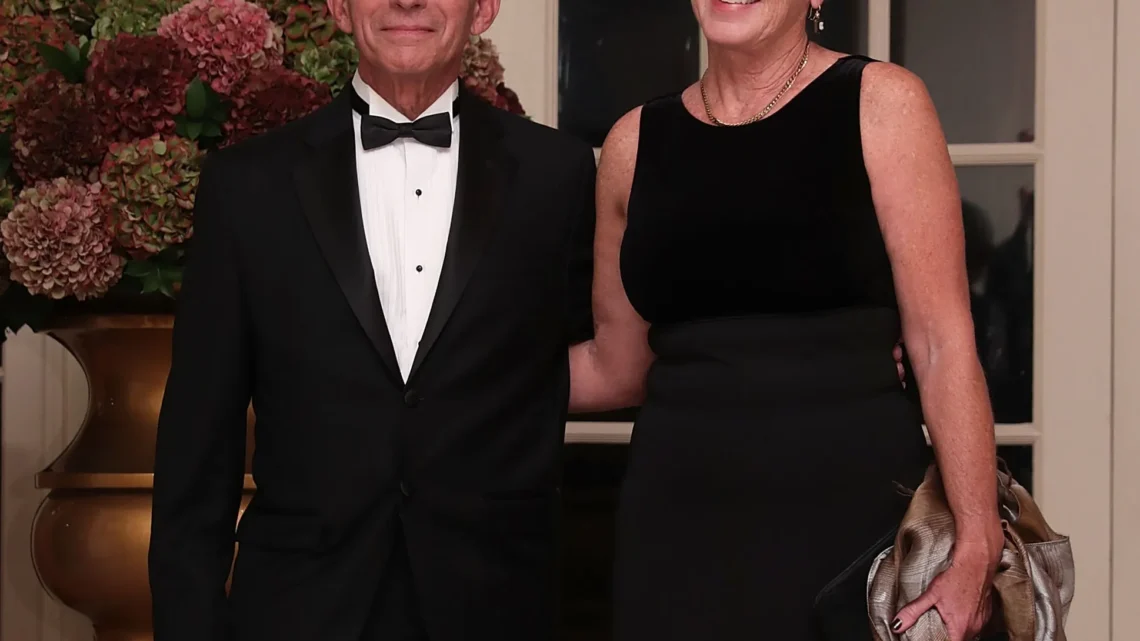
Christine Grady, Fauci’s Wife, Fired from NIH in RFK Jr.’s Sweeping Purge
0 Posted By Kaptain KushChristine Grady, a renowned bioethicist and the wife of Dr. Anthony Fauci, has been dismissed from her role as Chief of the Department of Bioethics at the National Institutes of Health (NIH) Clinical Center.
Her termination, confirmed on April 1, 2025, is part of a broad restructuring effort within the Department of Health and Human Services (HHS) under newly appointed Secretary Robert F. Kennedy Jr. Given her decades-long tenure at NIH and her high-profile marriage to Fauci, the former director of the National Institute of Allergy and Infectious Diseases (NIAID), Grady’s departure has sparked significant public discussion.
Trending Now!!:
- Matriarch Ethel Kennedy Passes Away at 96, Marking the End of an Era
- Karim Benzema’s Girlfriend Jordan Ozuna Biography: Age, Shows, Net Worth, Height, Spouse, Parents, Children, Instagram
- Raymond Umenze Biography: Age, State Of Origin, Net Worth, Girlfriend, Pictures, Movies, Instagram
- Aboki Naira To Dollar Black Market Rate Today 21st July 2024
- Noah Andrews Biography: Age, Net Worth, Parents, Height, Instagram, Wikipedia
Her termination is one of several high-profile dismissals across NIH, the Food and Drug Administration (FDA), and the Centers for Disease Control and Prevention (CDC). Reports suggest that senior officials involved in the government’s COVID-19 response—particularly those linked to vaccine development and policy—were among those affected by Kennedy’s reorganization.
Other notable departures include Dr. Clifford Lane, Fauci’s longtime deputy, and Dr. Jeanne Marrazzo, Fauci’s successor at NIAID. Some officials were offered reassignment to remote Indian Health Service offices in states such as Alaska and Montana, though it remains unclear whether Grady was given this option or was directly dismissed.
The restructuring, which resulted in thousands of HHS employees losing their positions, aligns with Kennedy’s stated goal of shifting the department’s focus toward preventive healthcare rather than what he has termed a “sick-care” model.
In a statement on social media, Kennedy described the firings as a necessary step in “recalibrating” HHS, which has drawn praise and criticism. While supporters see it as a bold effort to address what they view as failures in public health policy, critics argue it risks destabilizing key institutions at a time when public trust in healthcare remains fragile.
Born in 1951 or 1952 in Livingston, New Jersey, Christine Grady has had a distinguished career spanning over four decades. She is the daughter of John H. Grady Jr., a Yale-educated U.S. Navy veteran and former mayor of Livingston, and Barbara Grady, an assistant dean at Seton Hall University School of Law. She earned a B.S. in nursing and biology from Georgetown University in 1974, a Master of Science in Nursing from Boston College in 1978, and a Ph.D. in philosophy from Georgetown in 1993.
Grady began her career as a clinical nurse and later worked abroad with Project Hope in Brazil, where she learned Portuguese and gained firsthand experience with limited medical resources. Before transitioning into bioethics, she joined the NIH in the 1980s as a clinical nurse specialist. By 1996, she was deputy director of the NIH Department of Bioethics, eventually becoming its chief in 2012.
Her research has focused on ethical issues in clinical research, including informed consent, patient vulnerability, and the moral challenges healthcare providers face. She played a key role in shaping ethical guidelines during both the HIV/AIDS epidemic and the COVID-19 pandemic.
Grady has authored over 175 publications and several books, including The Oxford Textbook of Clinical Research Ethics. She served as a commissioner on the Presidential Commission for the Study of Bioethical Issues from 2010 to 2017. She is a member of the National Academy of Medicine, a senior fellow at the Kennedy Institute of Ethics, and a fellow of the Hastings Center and the American Academy of Nursing. Her accolades include multiple NIH Director’s Awards (2015, 2017) and the NIH CEO Award (2017).
Throughout her tenure, Grady’s role often intersected with her husband’s high-profile leadership during the COVID-19 pandemic, raising questions about potential conflicts of interest. As Fauci led the nation’s public health response, advocating for lockdowns, mask mandates, and vaccine policies, Grady provided ethical analysis that supported many of these measures. She defended vaccine mandates in interviews, arguing that personal choices could have societal consequences, such as job loss. Critics accused her of endorsing coercive policies, while supporters praised her for emphasizing public health ethics.
Notably, Grady’s department did not investigate the ethics of gain-of-function research, despite its ties to NIH funding through Fauci’s NIAID. Some critics have questioned whether her marital connection shielded certain research areas from ethical scrutiny, though no official inquiries were launched against her.
Fauci, in turn, credited Grady’s expertise in ethical principles as a guiding force during the pandemic, stating in a 2021 interview with The Greenwall Foundation that her insights strengthened his decision-making during controversial public health measures.
Grady met Fauci in 1983 at the NIH while serving as a translator for a Portuguese-speaking patient. They married in 1985 and have three daughters: Jennifer, a psychologist; Megan, an elementary school teacher; and Alison, a software engineer.
The couple largely maintained a low public profile until the pandemic propelled Fauci into the national spotlight. Their household income—Fauci’s $480,654 salary at retirement and Grady’s estimated $250,000+ salary as a senior NIH official—positioned them among the highest-earning federal employees. Their reported net worth rose from $7.6 million to $12.6 million between 2020 and 2021.
Public reaction to Grady’s dismissal remains divided. Some have welcomed her removal, viewing it as accountability for pandemic-era policies, while others argue that her expertise and contributions to bioethics warranted her continued presence in the field. Her next career steps remain uncertain, though she is expected to continue contributing to bioethics and public health discussions.
Meanwhile, Fauci, who retired from NIAID in 2022 and now teaches at Georgetown University, has not commented on Grady’s termination. Reports indicate that the couple has also lost their security clearances and Secret Service protection in the wake of the restructuring.


